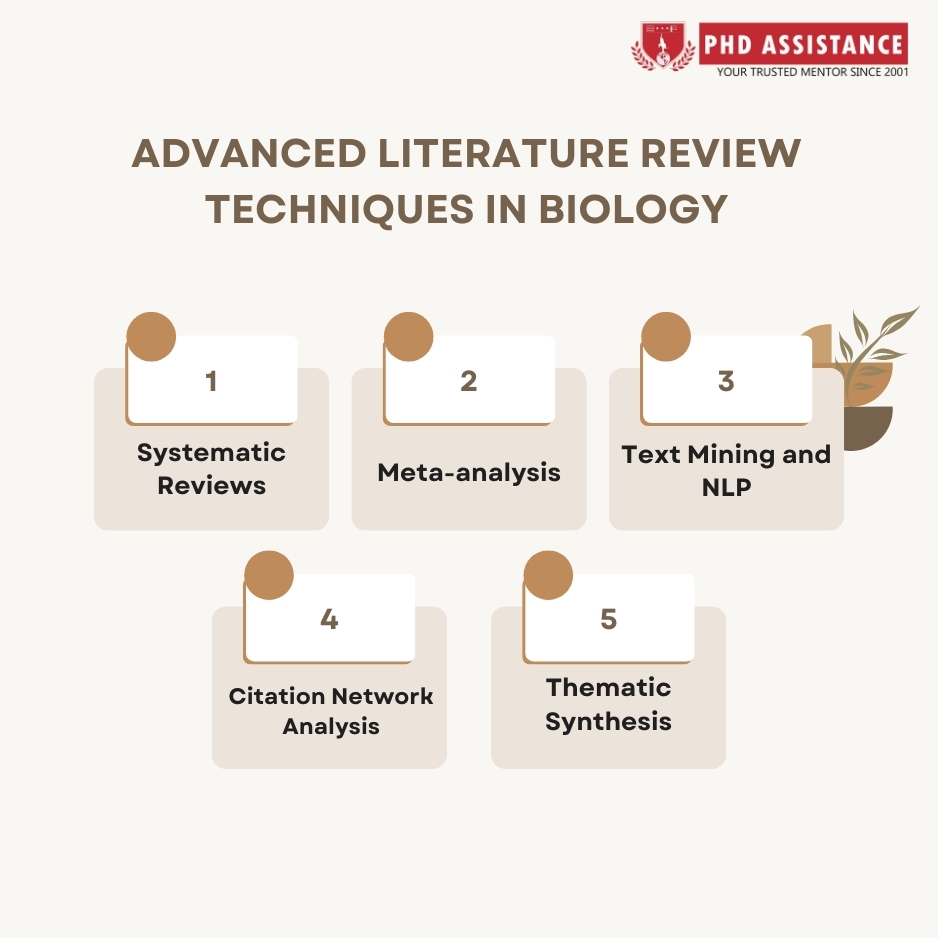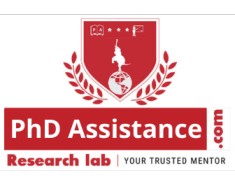Mastering Advanced Literature Review Techniques in Biology: Expert Guidance for Success
Hey, fellow biologists! Ready for a thrilling journey through the world of biology research? Buckle up because we’re diving deep into literature reviews, led by our expert team.
Navigating through scientific literature is like embarking on a daring expedition. But skimming won’t cut it. A top-notch literature review is about uncovering hidden treasures and connecting the dots for future breakthroughs.
With PhD Assistance, consider us your ally. We’re here to arm you with top-tier literature review services and advanced techniques, setting you apart from the rest.

Why are literature reviews vital in biology?
- Knowledge Synthesis: They lay a strong foundation for further exploration.
- Identifying Research Gaps: Pinpointing areas needing further investigation.
- Informing Research Design: Guiding decisions on methods and experiments.
- Contextualizing Findings: Understanding the broader context of research.
For impactful reviews, mastering advanced techniques is key. Secondly, let’s break down these advanced literature review techniques in biology:

- Systematic Reviews: Think of it as your go-to method, like a GPS guiding you through the scientific wilderness. It’s strict, methodical, and ensures you’re on track to unbiased, reproducible results. (Kulkarni, 2024)
- Meta-analysis: This is where you crunch the numbers, pooling data from multiple studies to uncover bigger trends. It’s like putting together a puzzle, piecing information together to see the full picture.(Triani et al., 2023)
- Text Mining and NLP: Picture a supercharged magnifying glass. With text mining and NLP, you can sift through mountains of text to find the gold nuggets—key concepts and relationships hidden in the words.(Hassani et al., 2020)
- Citation Network Analysis: Don’t overlook the power of citations. It’s like untangling a web, revealing connections between studies, influential papers, and how research trends evolve over time. (Li & Li, 2022)
- Thematic Synthesis: This is your qualitative approach, digging into recurring themes in the literature to gain deeper insights. It’s like mining
for gold, uncovering valuable nuggets of wisdom hidden within the research.
These techniques might seem complex, but they’re invaluable tools for navigating the vast sea of scientific literature in biology. So, armed with these methods, go forth and conquer the world of research! Mastering the ins and outs of advanced literature reviews in biology isn’t for the faint of heart. But hey, who said you had to go it alone? Let’s talk about tapping into the power of expert assistance to make your journey a whole lot smoother.

- Search Strategy Savvy: Ever feel like you’re drowning in search results? Yeah, been there, done that. That’s where expert consultants swoop in to save the day. They’ll help you craft search strategies that cut through the noise and get you straight to the good stuff.
- Critical Eye: Not all studies are created equal, my friend. You need someone in your corner who can separate the diamonds from the duds. Enter expert consultants, armed with the tools to scrutinize study design, sample sizes, statistical methods, and overall credibility.
- Data Wrangling Wizards: Extracting data and weaving it into a compelling narrative can feel like herding cats. But fear not! Expert consultants are here to streamline the process, armed with structured forms and advanced analytical techniques to whip your findings into shape.
- Wordsmith Extraordinaire: Let’s face it, writing a literature review isn’t exactly a walk in the park. But with expert consultants in your corner, you’ve got a secret weapon. They’ll polish your prose until it shines, ensuring your review is not just informative but downright captivating.
- Methodological Maestros: Feeling lost in the methodological wilderness? It happens to the best of us. But fear not! Expert consultants are here to be your trusty guides, helping you navigate the murky waters of research methodologies and analytical techniques.
So, there you have it, folks. With expert assistance by your side, conquering the world of advanced literature reviews in biology becomes not just possible but downright exhilarating. Ah, the quest for mastery in biological literature reviews – it’s like uncovering hidden treasures with a scientific twist! But here’s the deal: to truly excel, you’ve gotta think outside the box and embrace the latest tools and techniques. That’s where professional assistance and cutting-edge methodologies come in. With text mining, citation network analysis, systematic reviews, and meta-analysis at your disposal, you’ll be forging new paths and revolutionizing biology research. So, fellow adventurers, let’s dive into this thrilling journey to reshape the world of scientific inquiry – one literature review at a time!
References
- Hassani, H., Beneki, C., Unger, S., Mazinani, M T., & Yeganegi, M R. (2020, January 16). Text Mining in Big Data Analytics.
- Kulkarni, S. (2024, March 28). How papers with doctored images can affect scientific reviews.
- Li, N., & Li, R Y M. (2022, September 22). A bibliometric analysis of six decades of academic research on housing prices.
- Triani, F., Praminta, R., Tu’sadiah, H., & Yolanda, S A. (2023, June 30). Effects of Cooperative Learning Model in Science Learning on Students’ Cognitive and Critical Thinking Ability: A Meta Analysis.



